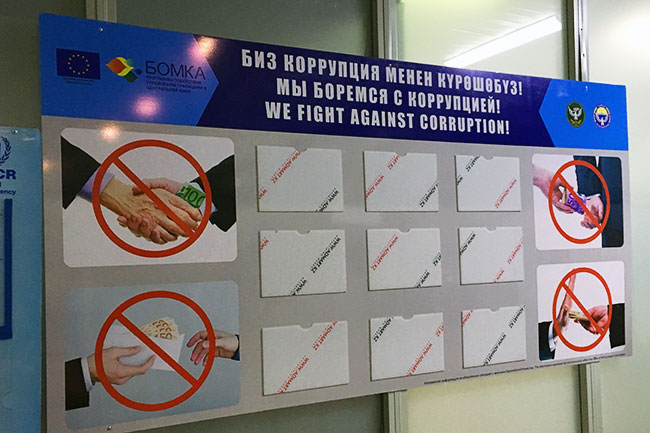By the time I reached my hostel in Bishkek, I had been stopped by the police three times while driving. One time I deserved to be, two times I didn’t; and every time I had to bribe the officers. Two I bribed with money, one I bribed with a pack of wet towels.
Maybe I got used too soon to the driving madness of Kyrgyzstan. Like many other countries in Asia, drivers just go.
No matter the traffic lights, no matter the rest of the cars or people, or even the road. They just go.
Eager to try it for myself, I rented a car in Karakol planning to drop it off in Bishkek. Soon enough I realized how easily one can get into an accident.
I will never forget casually driving within the limits of my lane, one car approaching on the other lane. Then, two cars popped up from behind that car, planning to overtake it. There was absolutely no way they could (both) overtake the car and return to their lane in time before they would hit my car head on.
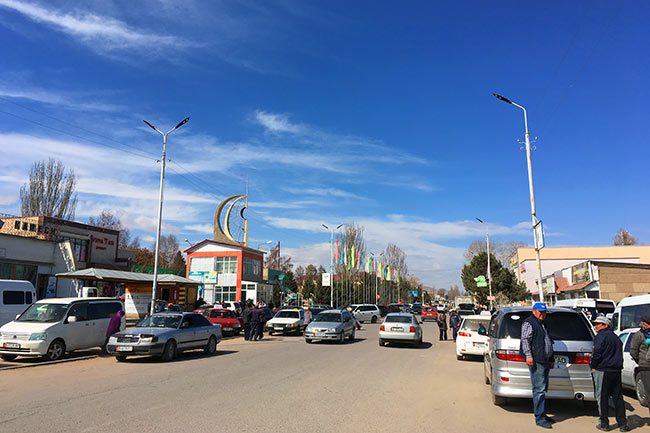
Stately, they passed on both sides of me. One squeezed between the first car and mine, and the other one crossed the whole road to my other side to continue forward.
From then on, I gradually started adopting their style as I drove west from Karakol, following the Issyk Kul belt road past Bokonbaevo, down towards Naryn and onto the Silk Road and through the mountain pass of Chaek towards Susaamyr and Toktogul.
Half week later, on my way north towards the capital, I was already driving like “one of them”. I must admit it was a lot of fun.
But noone told me about Bishkek. There’re no rules for driving in Kyrgyzstan, except in Bishkek. I had read online about corrupt policemen stopping foreigners throughout the country, but I had totally forgotten about it as I did not see a single officer out there. Seems like they were all waiting for me in Bishkek!
At the police station
As I got into the metropolis, I failed to notice that the other drivers were behaving more and more. I totally ignored the traffic signs as usual and proceeded to overtake the car in front in a fast maneuver, and then an officer saw me and told me to pull over. He took me to the station.
Inside the station, nobody spoke any English (they did know the word “money”, though). Inside, I was first told to blow into a breathalyzer. Disappointed with the result, they showed me to a bench where I had to wait.
Minutes later, I was taken to the “control room” where they played a video of me blatantly overtaking cars illegally. I nodded. They called an interpreter and through him I was ordered to show some documents; they would take my passport away for a few hours.
I did not like the sound of that and did not let go of my passport, and I was yelled at for a few minutes. I took out a paper copy from my bag and they accepted it. A guy disappeared with it.
Then, finally, I was told to pay: 5,000 KGS, or about 60 EUR. I played the “oh, but I don’t have so much cash on me” card, and faked not understanding the interpreter’s English when he asked me to go to a bank and come back.
The officer in the room got fed up and cut the call, and I was shown the bench again. Then the magical moment finally arrived: a younger officer sat next to me, and did a money-dealing gesture with his hands. “Money”.
I gave him all I had, about 5 EUR in KGS. “More money” “I don’t have any more money” “Dollars?” I gave him the 5 euro note I had. “No, no, more money” I showed him my empty wallet. And then he let go of me. Not too bad.
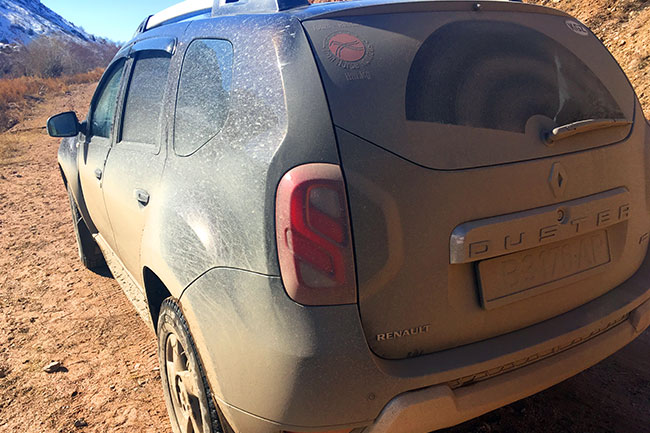
Bribing a policeman with wets towels
A second officer stopped me about ten minutes later. I was told to pull over. I did.
He told me to remain inside the car, and then he went around the car, he was so obvious! Through a translator app, he told me they stopped me because the back of my car was too dirty (I wonder which cars coming from the countryside aren’t).
Then he sat next to me inside the car, and said the magical word again, “money”. “I have no money” “Money, money” “Police took all my money” “No, no, you give me money” I showed him my empty wallet. Then he started going through my backpack.
I was afraid he would find my hidden money stash, but he failed to do so. Then he started picking up random objects in the car and gesturing “I will take this, OK?” First he wanted my phone charger, I yelled “NO, NO, NO”.
He pointed at a thermo that belonged to the car rental company. “This is not mine!”
A few objects later, he picked up a pack of wet towels. “This also belongs to the company, I need to return them”, but this time he took it with him. I wonder what made him take that instead of any other object before.
This is how I understood the situation: after stopping my car for a good bribe from a white foreigner and realising he would not be getting any money out of it, leaving empty-handed might have hurt whatever pride the corrupt officer had left. He definitely had to take something from me.
At first, he was not willing to take something actually expensive (such as the charger), but then he grew impatient and needed to take something. I was indifferent to a few objects he touched, and then I displayed some concern about the wet towels, so he might have thought that I would be in trouble without it.
I played along and even offered a box of towels that was already opened, and he probably took the bait and thought I was desperate not to lose that item. Or maybe I’m thinking too much of myself and he needed wet towels.
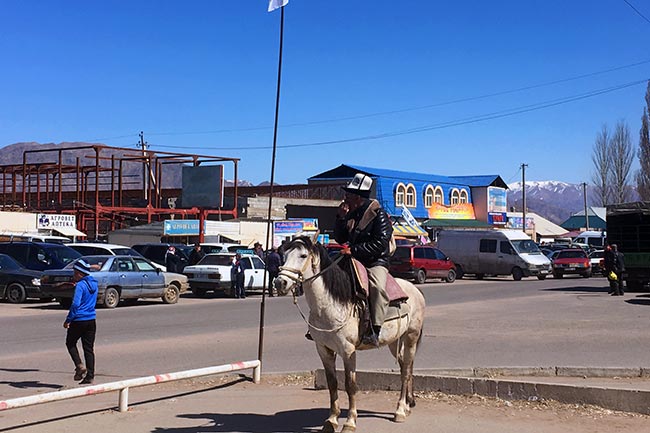
Third and last bribe
Finally, I was driving downtown, about to turn right to the car drop-off location, another policemen stopped me. I had stopped to eat and taken some money out of the hidden stash, big mistake!
Decidedly, he showed me a video of me performing a turn when the traffic light was… green. “So?” “Not allowed!” “But it is obvious it was green for me” “No, not allowed!” In a timely manner, the guy from the car rental company called me, so I took the phone and passed it to the police offer, let them sort it out. When they were done, the officer gave me my phone back.
Apparently, even though I drove when it was green, there was a hesitating pedestrian on the road who might or might have not wanted to cross. “Laws are very strict now to protect pedestrians in Bishkek” “It was green…” “Still, you’ll have to pay” “How much?” “2,000 KGS” I hung up, and sat inside the police car, next to the officer.
I then began an Oscar-worthy solo performance. Shouting, crying, cursing, recounting my day so far and how the police in Bishkek had taken all my money, and I was just a young, student who loved this country but the city ruined my trip and I did not have money for my hostel.
He told me to pay, and I repeated the whole thing. Fed up, he took a card reader and told me to pay. I told him about my entire life again. Then he started pushing the buttons: 2… 0… 0… and stopped there, and smiled at me. 200 KGS only, it worked!
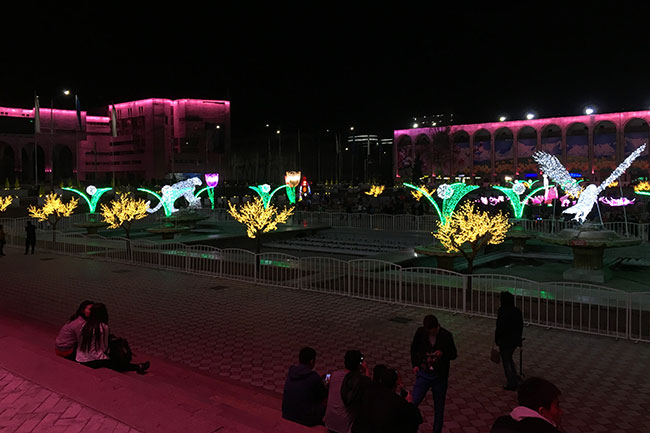
Before the start of my trip, I read online about policemen placed at the ends of every town, waiting for foreigners that drove around to stop and rip them off. I did not see any of that.
The few officers I saw around Naryn and Karakol regions were extremely helpful despite their not knowing much English. Then everything changed when I arrived in Bishkek, where policemen were very open and welcoming about bribes.
As soon as I returned the car, I felt like a free man walking the streets, finally untouchable by the police.
